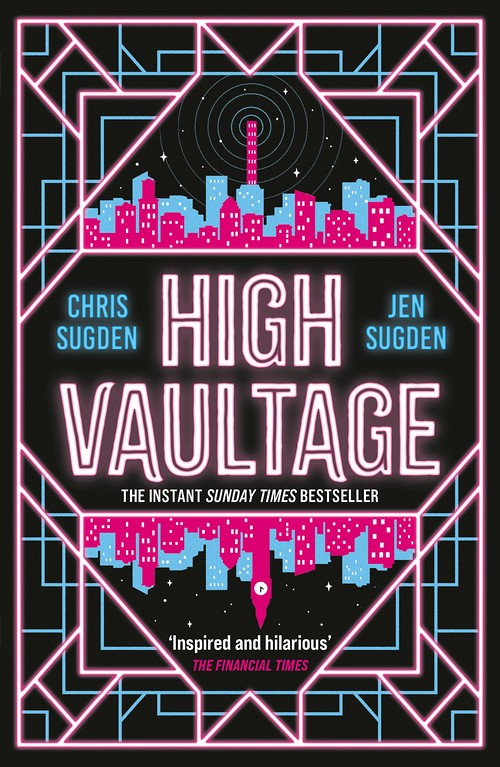
Today in our Big Idea for High Vaultage, co-author Chris Sugden is here to tell you of a tale of futures past — and what that bygone future means for the present we live in today.
CHRIS SUGDEN:
What the hell, exactly, is going on? Or even roughly? Any port in an epistemological storm.
A few weeks back I watched a video of a rocket the size of a 20-storey building being successfully caught on landing by a pair of similarly gargantuan chopsticks – an engineering triumph, and a historic milestone in humanity’s progress towards the stars. A moment later, I was watching a video of dozens of raccoons conducting an adorable, but nevertheless unstoppable, raid on someone’s living room.
I witnessed both thanks to the rocket company CEO’s other company. Not his satellite communications network, the one with meaningful strategic value in the largest European conflict since World War II. It was his social media website, the one where, by default, everything uploaded becomes fodder for yet another of his companies: one of those ones building the AI models that know more than anyone who has ever lived, but which also require the energy of entire nuclear power plants to reliably count the ‘r’s in ‘strawberry’.
Presumably, that AI now has a total mastery of raccoon military tactics, for purposes we can only guess at and fear.
I watched the videos on a hand-sized device that spends more time in my company than any other thing or person. A device I turned to halfway through drafting this article – because of course I did – and which rewarded me with chat groups firing away with, among other things, a rundown of candidates aiming to become the next Chancellor of Oxford University, a discussion of the ending of ‘Gossip Girl’, and a video of someone playing Finnish DJ Darude’s 1999 electronic dance hit ‘Sandstorm’ on a modified Singer sewing machine.
Look. My brain was meant for bipedal locomotion across savannahs and meeting at most a few hundred people in my entire life. It’s not cut out for any of this.
This is the big idea of High Vaultage, the novel I co-wrote with Jen Sugden (not a coincidental namesake – we’re married). The preposterousness, the bafflement, the absurdity of living through rapid technological change. Technobewilderment, let’s say.
In High Vaultage, the setting is ‘Even Greater’ London in 1887. The capital has expanded to encompass the entire southern half of England, its growth and technological advancement driven by electricity beaming outwards from a mile-high tower – the kind that might have existed had Nikola Tesla been better at business, and had the laws of physics not insisted on being what they are.
In Even Greater London, things are progressing so quickly it is hard for people to cope. Automatons are everywhere but barely work. Limitless electricity courses through the air, powering countless innovations and chargrilling birds in flight. The cultish engineer-army of Isambard Kingdom Brunel builds as many rail lines and viaducts as they feel like, without regard to whether anybody needs them or if they will ever connect to anything. And the city itself is so mind-shatteringly immense that gazing upon it from a high vantage point leads to headaches, nausea, and swift collapse.
Why the Victorian period? Because we’re hardly the first to feel the sensation of being helpless socks in the tumble dryer of history.
Consider the case of John Tawell. In 1845, Tawell murdered his mistress with cyanide before fleeing onto a train, escaping the local constabulary forever, only to be arrested at his destination, London Paddington, by police who had been alerted by telegram to stop the man dressed ‘in the garb of a kwaker’ – the technology having been invented so recently they hadn’t yet rolled out a way to transmit the letter Q.
That, in the wider view of history, is extremely bad luck. Imagine Tawell’s mystification as the physical world folded around him, its Euclidean geometry ruptured forever, with trains plodding the long way around reality while electrons zip along in an instant.
We know the Victorians were highly disorientated by the social and technological change of their times. It has been suggested that this goes some way to explaining the explosive popularity of sensation and detective fiction, with Holmes and his ilk offering order and meaning against the thundering confusion of a century of urbanisation.
Our writing too, 140 years later, takes the form of a detective story. The structure provides a place of stability from which to try to explore disorientation, to unpack the absurdities of accelerating change amidst the awe at humanity’s technological progress and despair at its control by untrustworthy actors.
Not that we should forget about these – the awe, in particular. I have a niece who is only alive thanks to miraculous advances in neonatal care, and if I ever meet any of the people who made it possible I will shake them by the hand and utter inarticulate, sobbing thanks – before asking if they’ve got anything in the works for getting my toddler to understand that naps are, in fact, good.
But progress is usually less clear than this. We’re only thirty years into personal internet access and fifteen years into smartphones. Our reality is bending into a new shape, and our telegrams don’t yet have letter Qs.
We must dive into the ambivalence, the disorder, the confusion. We must struggle to understand the manner in which we struggle to understand.
In Jen’s and my writing, we do this with a technologically advanced Victorian megacity, its cascading criminal mysteries, and the hijinks of a pair of mismatched detectives. It’s a study in chaos. But they, at least, have a chance at determining what the hell is going on.
High Vaultage: Amazon|Barnes & Noble|Powell’s|Signed editions from Premiere Collectables|Audible
Author Socials: Chris|Jen|Victoriocity
Source: The Big Idea: Chris Sugden











Recent Comments